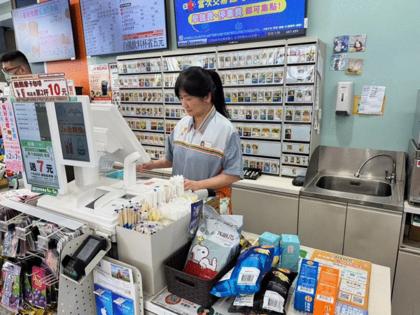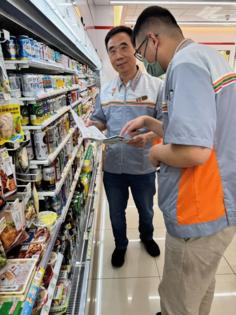Column: Why are Taiwan's 7-Elevens so much better than ours?
Published in Variety Menu
When I visit my family in Taichung, Taiwan, I've learned to never ask where we are going, because the answer is always the same: first, 7-Eleven.
Going to Taiwan has always meant going to 7-Eleven. My uncle runs a few stores in Taichung, Taiwan's second-largest city, and it's often our first stop after the airport.
When I visited last month, I learned 7-Eleven aphorisms abound in Taiwan. One goes like this: The Taiwanese people could live without their government, but they could not live without 7-Eleven.
The store looms so large in Taiwanese life that it might as well be a government agency. At any 7-Eleven, you can pay your taxes, ship or pick up packages, drop off your laundry, check your blood pressure, return library books, send faxes, buy rail and plane tickets, purchase internet access and, as a bonus, use the receipts for everything to play a lottery.
At one point, 30% of Taiwan's driver's license renewals took place at a 7-Eleven, according to a 2011 case study from National Chengchi University.
There are more convenience stores per capita in Taiwan than anywhere else in the world, one for every 1,582 people, according to a 2021 study by a Japanese consumer research firm. Chains such as 7-Eleven, Hi-Life and Family Mart cluster so thickly on Taipei's packed streets that many locations are within eyeshot of each other, often sharing a wall with a competitor.
About half of my extended family on my dad's side works in a 7-Eleven store, except for my cousin, who was poached by 7-Eleven's main competitor, Family Mart. We go for breakfast, beverages before and after meals and for dessert, often multiple times in a single day. When we pose for photos, my uncle likes to tell us to make the "seven" sign with our hands.
One year the sides for our Lunar New Year dinner came from 7-Eleven, prepackaged in containers ready to microwave. Same for the fruit to set at my grandpa and grandma's altar, as well as the joss paper to burn for their good fortune. Honoring our ancestors should be convenient. Surely they wouldn't want us to waste time.
It's a far cry from 7-Elevens in the United States, which reliably supply spare phone chargers, drinks or toiletries but are not known for much else. During busy, difficult periods of my life, I used to order something called a buffalo chicken roller, a log of breaded, extruded ground chicken in a menacing shade of red.
The story of 7-Eleven in Taiwan is often told as an example of Asian entrepreneurial spirit and logistical ingenuity. Taiwan built a convenience store model that captured the frenetic energy of the booming economy and became essential to nearly every aspect of life. But I would argue that a full accounting of its influences shows the chain's modern innovations were a collaborative effort that couldn't have existed without friendly, productive relationships between globalized economies.
7-Eleven began as a chain of Texas ice stores run by the Southland Corp. in 1927, originally called "Tote'm Stores," which referred to the Native American-themed totems used to draw customers, according to the company's website. Founder Joe C. Thompson realized that his far-flung ice stores served customers in need of basic groceries, and he started offering staples such as bread, milk and eggs, creating the nation's first convenience stores.
Driven by sales of Slurpees and Big Gulps, the chain grew to more than 66,000 stores. But it struggled after the 1987 stock market crash, and in 1990, the company filed for bankruptcy and was sold to 7-Eleven Japan, according to Times archives.
Executives with Uni-President Enterprises Corp., the parent company, decided to create a chain of stores inspired by the clean, brightly lit supermarkets they saw in America and bought a license to the 7-Eleven name in Taiwan.
The innovations produced in the pressure cooker of Taiwan's industrializing economy were shaped by the unique demands of Taiwanese culture at the time, according to Shih-Fen Chen, a business professor at Western Washington University who has conducted extensive case studies of Taiwanese businesses. He sums up the differences between American and Taiwanese 7-Elevens with another aphorism:
"In the U.S. you don't need 7-Eleven to have a good life," Chen said. "In Taiwan you cannot have a good life without 7-Eleven."
And I would add another layer to 7-Eleven's origin story. The American grocery stores that Asian business executives admired owe influence to the agricultural and retail innovations of farmers and grocers in Southern California, where some of the nation's first market chains were born.
And Japanese American food producers and retailers were pioneers in the industry before World War II, according to research by Scott Kurashige, a historian and author of the book "The Shifting Grounds of Race."
According to Hoji Shinbun, an archive of Japanese American newspapers hosted online by Stanford University, there were more than a thousand Japanese produce markets in Los Angeles in 1940. These shops arranged vegetables by color and condition, and allowed customers to select their own produce. In addition to increasing yields and profits, these early agricultural entrepreneurs pioneered the roadside produce stand, which featured neat, stacked displays of washed produce that allowed customers to select their own fruits.
By the time my uncle started running a 7-Eleven in the 1990s, it bore little resemblance to the ones you see in Los Angeles. The chain's attempt to imitate Western grocery stores had instead created something uniquely Taiwanese.
When 7-Eleven's first stores opened in Taiwan in 1979, it was part of a larger societal embrace of American commercial behavior that many saw as a necessary precursor to achieving global competitiveness, Chen said. In a booming economy, people started drinking lots of coffee and working around the clock — and 7-Eleven was there to supply them.
Taiwanese families, my own included, wore Western clothes and listened to the Beatles and Simon & Garfunkel. My father came to America because, back then, going to the U.S. was seen as the best way to secure a future for his family.
But the miracle of convenience that is 7-Eleven in Taiwan tells a different story, one that doesn't belong to a single country. Its blend of Asian convenience and American consumerism could not exist without the free flow of people and ideas across borders and the contributions of immigrants. I would argue that the same is true for most of the world's best ideas.
Over time, Taiwan's 7-Eleven stores cut the Slurpee and the Big Gulp and focused on local flavors, creating the store's signature aroma — a potent blend of tea eggs marinated with cinnamon and star anise, fish cakes and roasted sweet potatoes.
It's a scent that I once found strange. But now it smells like home.
©2024 Los Angeles Times. Visit at latimes.com. Distributed by Tribune Content Agency, LLC.










Comments